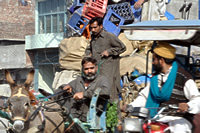Development and human rights
OHCHR and the right to development
Development is a human right that belongs to everyone, individually and collectively. Everyone is “entitled to participate in, contribute to, and enjoy economic, social, cultural and political development, in which all human rights and fundamental freedoms can be fully realized,” states the groundbreaking UN Declaration on the Right to Development, proclaimed in 1986.
The key elements of the right to development are as follows:
- People-centered development. The Declaration identifies “the human person” as the central subject, participant and beneficiary of development (art. 2).
- A human rights-based approach. The Declaration requires that development be carried out in a manner “in which all human rights and fundamental freedoms can be fully realised” (art. 1).
- Participation. The Declaration insists on the “active, free and meaningful participation” of individuals and populations in development (art. 2).
- Equity. The Declaration highlights the importance of the “fair distribution of the benefits” of development (art. 2).
- Non-discrimination. The Declaration allows no “distinction as to race, sex, language or religion” (art. 6).
- Self-determination. The Declaration requires the full realisation of the right of peoples to self-determination, including full sovereignty over their natural wealth and resources (art. 1).
Sharing the benefits of development
 The pursuit of economic growth is not an end in itself. The right to development puts people at the center of the development process, so that development is aimed to improve “the well-being of the entire population and of all individuals on the basis of their active, free and meaningful participation in development and in the fair distribution” of the resulting benefits.
The pursuit of economic growth is not an end in itself. The right to development puts people at the center of the development process, so that development is aimed to improve “the well-being of the entire population and of all individuals on the basis of their active, free and meaningful participation in development and in the fair distribution” of the resulting benefits.
Widening inequality within and among countries, poverty gaps, food shortages, climate change, economic crises, armed conflicts, rising unemployment, popular unrest, and other pressing challenges confront our world today. The right to development, which embodies the human rights principles of equality, non-discrimination, participation, transparency and accountability as well as international cooperation and solidarity, can guide our responses to a series of contemporary issues and challenges including in the achievement of the Sustainable Development Goals.
Empowerment and accountability for all
 The right to development is not about charity, but enablement and empowerment. The Declaration identifies obstacles to development, empowers individuals and peoples, calls for an enabling environment and good governance at both national and international levels, and enhances accountability of duty bearers - governments, donors and recipients, international organizations, transnational corporations, and civil society.
The right to development is not about charity, but enablement and empowerment. The Declaration identifies obstacles to development, empowers individuals and peoples, calls for an enabling environment and good governance at both national and international levels, and enhances accountability of duty bearers - governments, donors and recipients, international organizations, transnational corporations, and civil society.
Find out more in the publications and resources available on the topic of the right to development.
Read more about the milestone events in the right to development